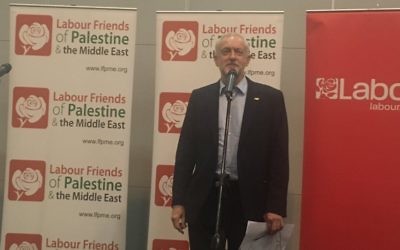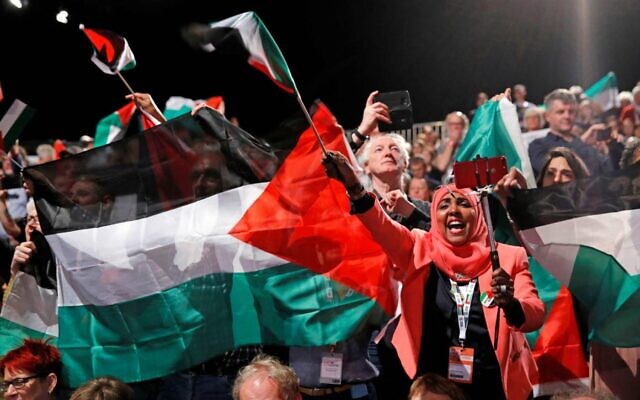Labour could drop Palestine recognition commitment from general election manifesto
EXCLUSIVE: Party chiefs determined to produce a slimline manifesto focusing only on the core issues they believe will chime with the electorate as they seek to secure power in No.10 for Keir Starmer
Lee Harpin is the Jewish News's political editor
Labour could drop a commitment to the immediate recognition of a Palestinian state from its election manifesto as part of a shift towards a slimline document ‘for a party fit for government, rather than one wishing to remain in opposition.’
Jewish News understands party chiefs are determined to produce a manifesto highlighting only the core issues that they believe will put Keir Starmer in pole position to become Prime Minister when the country next goes to the polls.
Since 2014 under Ed Miliband’s leadership the Labour manifesto has included a specific pledge stating that in government the party would seek to immediately recognise a Palestinian state.
Current middle east minister Bambos Charalambous was asked early this month at the Jewish Labour Movement’s annual conference about this commitment.
He told the audience:”We would recognise a Palestinian state, as things stand.”
But two senior party sources have told Jewish News that under Starmer’s leadership there is a determination to ensure the manifesto includes pledges around issues seem as vital to winning over the UK electorate – on areas such as the NHS, education, transport and the environment.
Consultations about party policy ahead of the manifesto being finalised later this summer are set to begin later this month.
Labour’s National Policy Forum, (NPF) the group that decides on the party’s election manifesto, opens a consultation which begins on January 30th, and runs until March 17th, offering stakeholders, affiliates or members the opportunity to shift policy.
The NPF will then regroup and hold a final stage meeting in July, into which the consultation stage will be considered, before the final election manifesto is agreed.
Jewish News understands that the slimline manifesto favoured by some party chiefs, would still include a broad commitment to peaceful resolution of conflicts across the globe.
One party source added:”Leaving out Palestinian recognition from the election manifesto does not in any way mean Labour are not still committed to a two-state solution for both Israel and for the Palestinians.
“Nor does it mean we are not prepared to call out the most far-right Israeli government in history, when we need to do so.
“But unlike under the previous leader Jeremy Corbyn, we do not believe our stance over a conflict in the Middle East is one that is at the top of most voters in this country’s priorities.
“We are determined to become the next government, and have no wish to continue with manifesto commitments suited to political parties who wish to remain in opposition.”
Ex-leader Corbyn was outspoken on the issue, regularly calling for “immediate and unconditional recognition of the State of Palestine”, with the policy featuring in both the 2017 and 2019 manifestos.

Notoriously, Labour’s annual conference event in 2018, just one year before their catastrophic election defeat to Boris Johnson, saw hundreds of Palestinian flags waved by activists in the main hall, giving the impression to issue neared the top of the party’s concerns.
This move was aided by Ed Miliband’s decision in 2014 to shift the party towards an openly pro-Palestinian stance.
Abandoning what many in the community had seen as a “balanced” stance on the conflict, Jewish donors in turn ended their support for Labour as a result of the shift.
The mood worsened as Miliband instructed his MPs to back a symbolic backbench Labour motion urging Tory leader David Cameron to recognise a Palestinian state.
The move led to some potential Jewish Labour voters abandoning the party in the key North London seats at election time.
Miliband voted for the motion, but in a sizable rebellion over 60 Labour MPs abstained.
Among those not to vote in support of the motion was Rachel Reeves, now shadow chancellor and one of Starmer’s closest allies.
Reeves recently told the annual LFI reception she would always be a “friend of Israel.”
Groups such as Labour Friends of Israel have long opposed the commitment to immediate recognition of a Palestinian state, arguing it rewards the Palestinian Authority before they have even committed themselves to peace negotiations with the Israelis.
But some now argue that LFI’s position has lost its impact, because of the increasingly right-wing nature of the Israeli government, in which Religious Zionist ministers refuse to even accept the idea of a Palestinian state.
Speaking at the JLM event earlier this month, middle east minister Charalambous argued that immediate recognitioncould “help kick-start any sort of talks around working towards a two-state solution. Because at the moment nothing is happening.”
The pro-peace group Yachad argue in favour of recognition of a Palestinian state.
They argue s upporters of Israel must recognise the existence, rights and sovereignty of both states.
A formal recognition of Palestine presents an opportunity for the Palestinian leadership to pursue diplomatic strategy.
Starmer has also held regular meetings with communal groups, including the Board of Deputies, to discuss issues involving the community.

A Board spokesperson said they would not discuss the content of meetings.
“The Board of Deputies is committed to a two-state solution and would like to see all parties with an interest in the Middle East work towards achieving that goal,” a spokesperson told Jewish News.
It is understood that some communal figures have urged Labour to be more outspoken in its criticism of the Israeli government, on issues such as occupation and anti-LGBT+ policies.
Jewish News has contacted Labour for comment on its manifesto plans.

Thank you for helping to make Jewish News the leading source of news and opinion for the UK Jewish community. Today we're asking for your invaluable help to continue putting our community first in everything we do.
For as little as £5 a month you can help sustain the vital work we do in celebrating and standing up for Jewish life in Britain.
Jewish News holds our community together and keeps us connected. Like a synagogue, it’s where people turn to feel part of something bigger. It also proudly shows the rest of Britain the vibrancy and rich culture of modern Jewish life.
You can make a quick and easy one-off or monthly contribution of £5, £10, £20 or any other sum you’re comfortable with.
100% of your donation will help us continue celebrating our community, in all its dynamic diversity...
Engaging
Being a community platform means so much more than producing a newspaper and website. One of our proudest roles is media partnering with our invaluable charities to amplify the outstanding work they do to help us all.
Celebrating
There’s no shortage of oys in the world but Jewish News takes every opportunity to celebrate the joys too, through projects like Night of Heroes, 40 Under 40 and other compelling countdowns that make the community kvell with pride.
Pioneering
In the first collaboration between media outlets from different faiths, Jewish News worked with British Muslim TV and Church Times to produce a list of young activists leading the way on interfaith understanding.
Campaigning
Royal Mail issued a stamp honouring Holocaust hero Sir Nicholas Winton after a Jewish News campaign attracted more than 100,000 backers. Jewish Newsalso produces special editions of the paper highlighting pressing issues including mental health and Holocaust remembrance.
Easy access
In an age when news is readily accessible, Jewish News provides high-quality content free online and offline, removing any financial barriers to connecting people.
Voice of our community to wider society
The Jewish News team regularly appears on TV, radio and on the pages of the national press to comment on stories about the Jewish community. Easy access to the paper on the streets of London also means Jewish News provides an invaluable window into the community for the country at large.
We hope you agree all this is worth preserving.






















